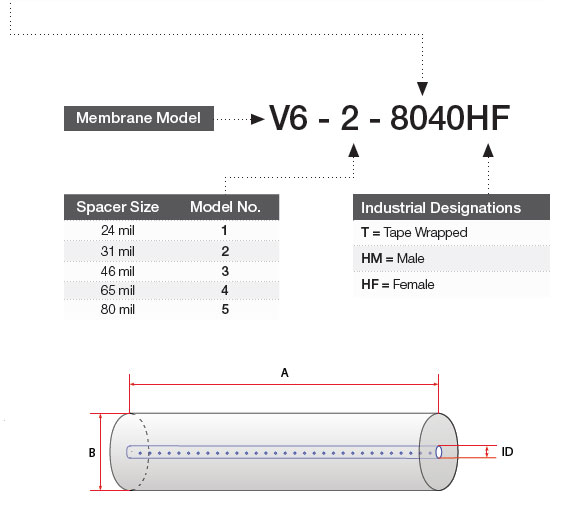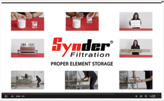![]() Industrial Ultrafiltration Spiral-Wound Element:
Industrial Ultrafiltration Spiral-Wound Element:
MQ(PES 50kDa)
Synder Filtration’s Ultrafiltration Elements offer an optimal combination of both flux and rejection in a comprehensive range of MWCO’s. Contact us today to learn more about our complete line of membrane products and services.
MQ is another PES-based ultrafiltration membrane commonly used for specialty protein separation in the dairy industry and beverage clarification in the food & beverage industry. With a molecular weight cut-off of 50kDa, it lies between MK and LY and can be used for similar applications. Flat sheet, standard spiral-wound elements, and custom element configurations are available, as well as MAX versions, which offer additional resistance to high pH and high temperatures.
INDUSTRIAL SERIES BENEFITS
- Widest range of UF MWCO’s available
- Good resistance to pH and temperature
- High resistance to fouling
- Customizable dimensions for unique housings
COMMON APPLICATIONS
- Specialty protein separation
- Beverage clarification
Element Specifications
RECOMMENDED OPERATING PARAMETERS
| Membrane Type | |
| Proprietary PVDF | Spiral-Wound with netted outerwrap or fiber glass hardshell (FRP) |
| Pressure | PSI | Bar |
| Max Inlet Pressure | 116 | 8.0 |
| Min Outlet Pressure | 10 | 0.7 |
| Max Differential Pressure per Element | 18 | 1.2 |
| Max Permeate Backpressure | 5 | 0.3 |
Note: Soft start on boost pumps required to minimize pressure/flow shocks to elements.
| Temperature | Fahrenheit | Celsius |
| Max. Operating | 122° | 50° |
| Max. CIP Temperature | 122° | 50° |
| pH Parameters | pH |
| pH Range during Operation at 25°C Max | 1.0-11.0 |
| pH Range during CIP Operation at 50°C Max | 2.0-11.0 |
| Peroxide | Max ppm. |
| Free Peroxide in Product During Operation | <3 ppm |
| Peroxide as a sanitizer at 25°C Max, pH6-7, 10minutes recirculation | 0.1% |
| Chlorine | Norm PPM | Max PPM |
| Free Chlorine During Operation | 0 | <0.1 |
| Chlorine During CIP at pH10.8-11.0 and 50°C | 150 | 180 |
Note: Maximum chlorine exposure for all elements is 30 minutes per day at pH and temperature conditions listed above.
DIMENSIONS & WEIGHT
| Element | Model No. | Diameter (B) in (cm) | Length (A) in (cm) | PWT ID/OD in (cm) | Tube Extension (C) in (cm) | Dry Weight lb (kg) |
| 1.8" | 1812TM | 1.8” (4.6) | 11.75” (29.8) | 0.665” (1.71) | 0.75” (perm) 1.00” (plug) |
1.0 (.45) |
| 2.5" | 2540TM 2540HF 2540HM |
2.4” (6.1) 2.4” (6.1) 2.4” (6.1) |
40.0” (101.6) 40.0” (101.6) 40.0” (101.6) |
0.75” (1.90) 0.625” (1.59) 0.75” (1.90) |
1.00” (2.54) – 1.00” (2.54) |
4.0 (1.8) 4.0 (1.8) 4.0 (1.8) |
| 4" | 4040TM 4040HM 4040HF |
3.9” (9.9) 3.9” (9.9) 3.9” (9.9) |
40.0” (101.6) 40.0” (101.6) 40.0” (101.6) |
0.75” (1.90) 0.75” (1.90) 0.625” (1.59) |
1.00” (2.54) 1.00” (2.54) – |
12.0 (5.5) 12.0 (5.5) 12.0 (5.5) |
| 8" | 7940HF 8040HF |
7.9” (20.1) 7.9” (20.1) |
40.0” (101.6) 40.0” (101.6) |
1.138” (2.89) 1.125” (2.86) |
– – |
35.0 (15.9) 35.0 (15.9) |
Recommended Element Cross Flow Rate
| Element | Feed Spacer (in miles)
|
||||||||||
| 1.8" | m3/hr gpm |
0.7 3 |
0.8 3 |
0.9 4 |
1.0 4 |
1.1 5 |
|||||
| 2.5" | m3/hr gpm |
1.3 6 |
1.5 7 |
1.8 8 |
2.0 9 |
2.1 9 |
|||||
| 4.0" | m3/hr gpm |
3 15 |
4 17 |
5 20 |
5 23 |
5 24 |
|||||
| 8" | m3/hr gpm |
15 66 |
17 75 |
20 89 |
23 99 |
24 105 |
|||||
*Note: The recommended cross flow rate will be subject to differential pressure limitations and specific applications.

Membrane Area(SQ. FT.)
| Element | Feed Spacer (in mils)
|
|||||||||
| 1812TM | 3.1 | 2.7 | 2.1 | 1.6 | 1.3 | |||||
| 2540M | 28 | 24 | 20 | 16 | 13 | |||||
| 2540F | 30 | 26 | 22 | 17 | 14 | |||||
| 4040M | 81 | 72 | 58 | 46 | 39 | |||||
| 4040F | 86 | 75 | 61 | 49 | 41 | |||||
| 7940F | 379 | 335 | 268 | 210 | 178 | |||||
| 8040F | 379 | 335 | 268 | 210 | 178 | |||||
TECHNICAL NOTES
For element sizes not listed, please call or email Synder Filtration for details. We can design an element to fit your exact needs – just specify the element outer diameter (OD) or vessel/housing inner diameter (ID), element inner diameter (ID), and length. Elements are also available with or without a controlled bypass tail. Additional feed spacers are also available. Trials should be conducted to determine optimal application conditions.
Applications
Similar Membranes

questions? Fill out this form. We’ll contact you within 24 hours!
Resources
MEMBRANE RESOURCES
- Definition of a Membrane
- Membrane Materials: Organic vs. Inorganic
- Pressure-Driven Membrane Filtration Processes
- Concentration Polarization in Pressure-Driven Processes
- Degrees of Membrane Separation
- Flux Behavior in Membrane Processes
Module Configurations & Processes
-> View all membrane resourcesTUTORIALS










